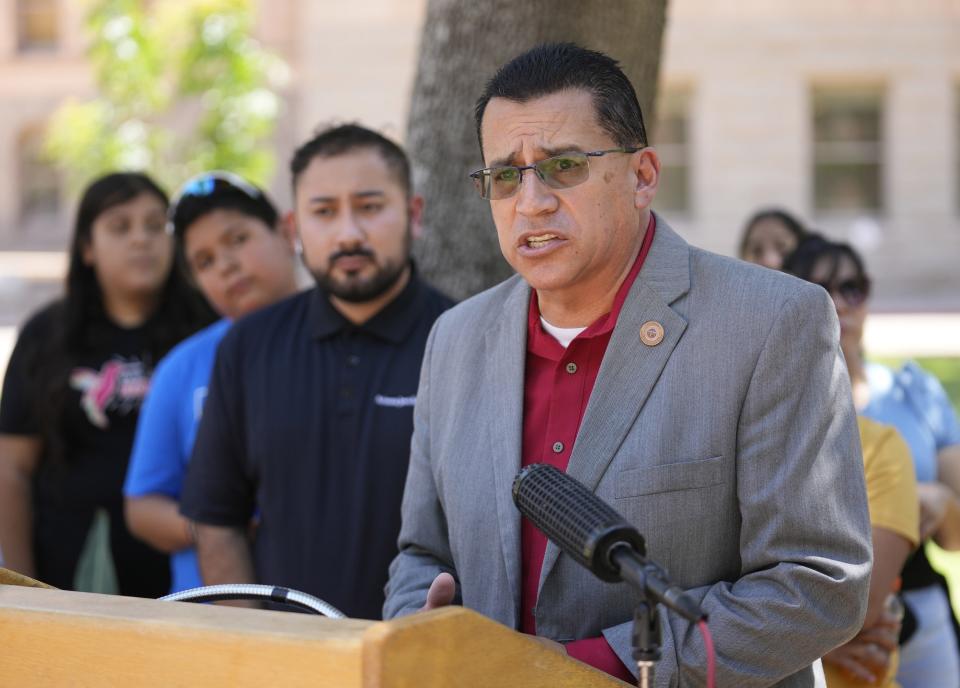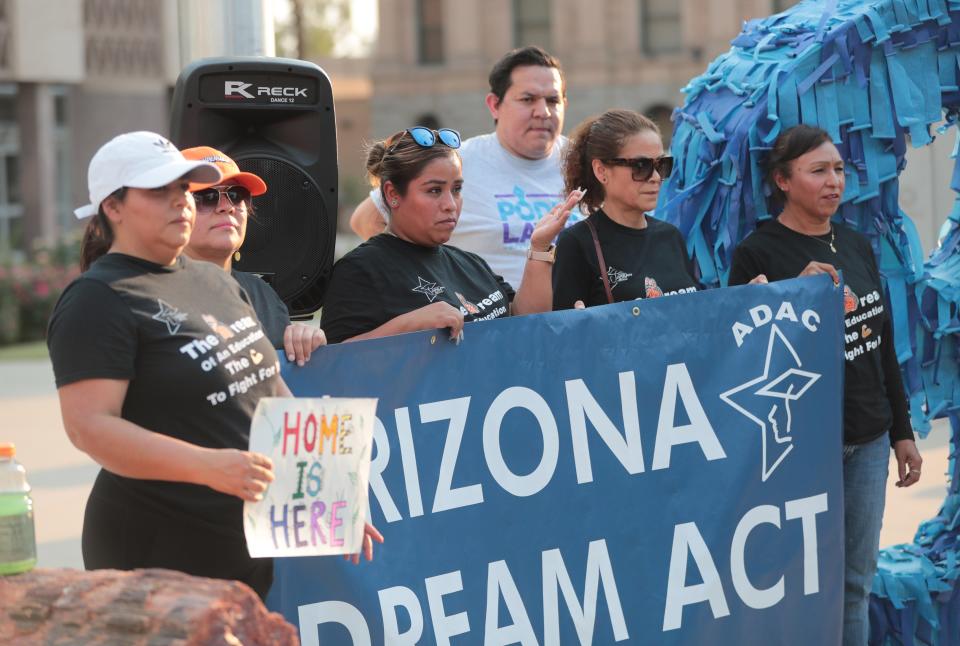'We still don't have a pathway to citizenship': Activists demand change on 10th anniversary of DACA
Corrections & Clarifications: In a previous version of this article, Poder Latinx community organizer Melissa Martínez's name was misspelled.
DACA recipients, community leaders and local activist groups came together in Phoenix on Wednesday at the Arizona Capitol as they met with state representatives to discuss the demands of the community.
A decade after the establishment of the Deferred Action for Childhood Arrivals program, an Obama-era policy that protects undocumented immigrants who came to the U.S. as children, local organizations continue to celebrate the opportunities that opened up for immigrant youth raised in the country, but they also continue to demand changes.
A decade of DACA: Offering relief, but no solution to undocumented immigrants
Karina Ruiz, executive director of the Arizona Dream Act Coalition, spoke at a press conference during the Wednesday event.
She said that since DACA came out in 2012, progress in the issues that "Dreamers" experience has been halted and even reversed on multiple occasions by changing policies in the government, which according to Ruiz has caused confusion and frustration among the community.

"Our community sometimes, I think they feel very confused, they don't even know what to expect. These 10 years have been very stressful, it's been something difficult to navigate," Ruiz told The Arizona Republic. "It is sad and dehumanizing what they are doing to our community."
During the Wednesday meetings, activists called for state representatives to protect Dreamers' rights in the wake of the Texas v. United States court case in which seven states, led by Texas, are challenging DACA as a constitutional program.
In July 2021, U.S. District Court Judge Andrew Hanen ruled in favor of the lawsuit, determining that DACA was unlawful but allowing its renewal for current recipients.
Mexican American Legal Defense and Educational Fund, a Latino civil rights organization and one of the parties in the lawsuit filed a notice of appeal in September, followed by the Biden administration.

Last month, the 5th U.S. Circuit scheduled an oral argument to take place on July 6 in New Orleans.
"For me, it's been very difficult because we still don't have a pathway to citizenship after so long, and it's in danger next month that the appellate court in the 5th Circuit will end the program again," Ruiz said. "Being in limbo is very difficult."
Melissa Martínez, community organizer with Poder Latinx, said she believes DACA is an important achievement for the community as it has offered relief and protection for undocumented immigrants from deportation, and it has opened a pathway to more opportunities like education.
"This is an achievement that we obtained 10 years ago for all undocumented immigrants, who were able to find opportunities that they did not have before," Martínez told The Republic. "It's a great pride, 10 years is an important celebration."

However, Martínez said she believes there's still work that needs to be done for the immigrant community.
"It's still not what we want. This is not enough," Martínez said. "Although we want to celebrate our triumph and our strength, we still want more."
Event organizers included the Arizona Dream Act Coalition, Poder Latinx, AZ Jews for Justice, Corazon and Living United for Change in Arizona. The groups hosted events throughout the day at the state Capitol for the 10th anniversary of the executive order.
"Yes, today we will celebrate the DACA program, and how it has helped hundreds of thousands of young undocumented immigrants stay home and live their lives. But this is a government band-aid that does not in any way replace lasting protection for immigrant families," LUCHA and the American Council on Education said in a joint statement released on Wednesday.
For students: Undocumented students struggle to pay for Arizona universities. What resources are there?
Fighting for a pathway to citizenship
Ruiz said she arrived in the United States when she was 15 and was able to graduate from high school and attend Arizona State University because of the benefits she received as a DACA recipient.
In 2006, however, Arizona Proposition 300 passed. By 2007, Ruiz's tuition had tripled because of out-of-state fees, forcing her to drop out of school with only one semester left to graduate with a bachelor's degree.
Taking one class at a time — which according to Ruiz cost almost as much as a 12-credit-hour semester — it took her 12 years since the start of her academic career to graduate with a bachelor's degree.
She graduated in 2015 with a biochemistry degree from ASU.
"I said, 'Well, now I have a bachelor of science, now I can go work in science!'" Ruiz said. "And then I realized DACA is temporary. DACA is not permanent, it does not have a legal pathway to citizenship."
So Ruiz decided to prioritize her fight to attain such rights for herself and those in her community.
"What I had to do was again a tough decision. I remember telling my family at the kitchen table, 'I'm gonna put my dream on hold once again,'" she said. "I need to make sure that I fight for a pathway to citizenship for people like myself before I can move on."
Ruiz said Wednesday was the first time in which local activists organized meetings with state representatives throughout the day to discuss community concerns.
"We're coming to this place where decisions that affect our very own life on a daily basis are happening," she said. "I've empowered myself to have a voice for me and my community and many other community members are being empowered by meeting with legislators to tell them their stories and to tell them what we need them to do."
Some of the state legislators who the groups met with on Wednesday included Sen. Raquel Terán, Rep. Brian Fernandez, Rep. Martin Quezada, among others.
Rep. Lupe Diaz and Rep. Jennifer Pawlik canceled their meetings with the activists, which according to Ruiz had been scheduled about a month ago.
U.S. Rep. Ruben Gallego said in a statement released on Wednesday that he plans to continue advocating for the rights of DACA recipients.
"DACA is not and will never be a substitute for true, comprehensive immigration reform. As I have said throughout my time in Congress, we must repair our broken immigration system so DACA recipients can rest easy knowing their protective status will not be rescinded through an executive order. It is what we owe to our nation’s Dreamers, and we must get it done,” the statement said.
A resource fair organized by LUCHA and ACE will also take place from 10 a.m. to 1 p.m. Saturday to celebrate the anniversary of DACA at Metro Tech High School School Cafeteria, 1900 W. Thomas Road, Phoenix.
Reach breaking news reporter Laura Daniella Sepulveda at lsepulveda@lavozarizona.com or on Twitter @lauradNews.
Support local journalism. Subscribe to azcentral.com today.
This article originally appeared on Arizona Republic: Local organizations celebrate, demand change after a decade of DACA

